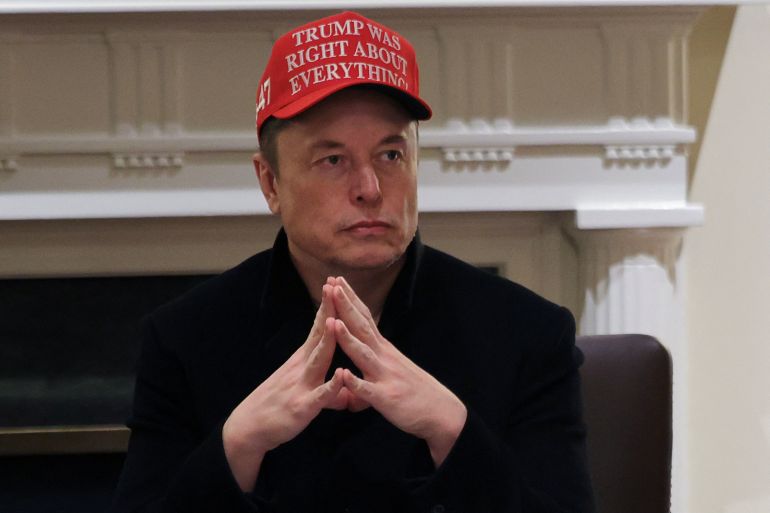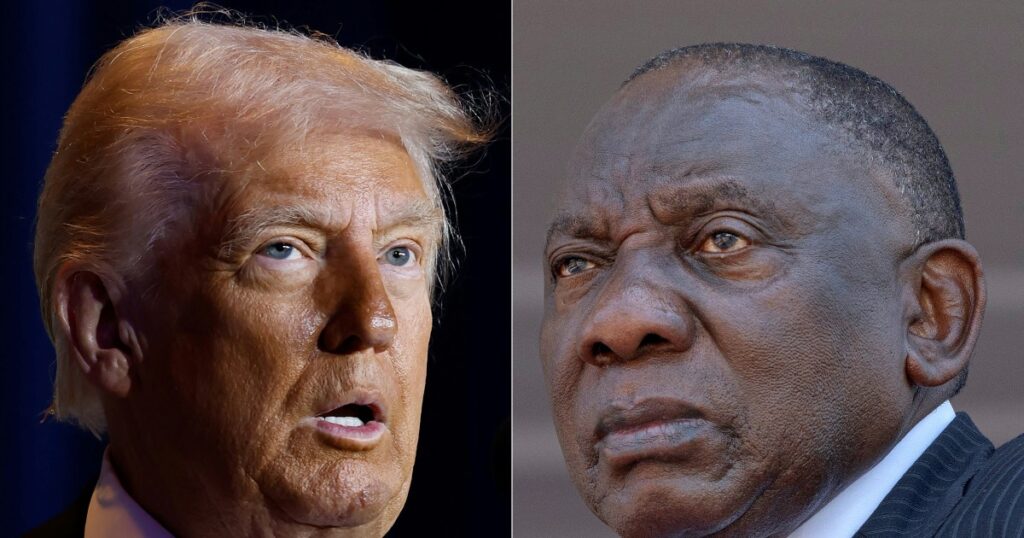South Africa’s President Cyril Ramaphosa will meet United States President Donald Trump in the White House on Wednesday, in an attempt to reset deteriorating relations between the two countries.
A major topic of contention between the two leaders is South Africa’s recent passing of a land expropriation law, which Trump has denounced and said is tantamount to “persecution” of the country’s rich white minority.
Last week, the first set of white South African “refugees” landed in the US as part of a larger relocation plan for the group under the Trump administration. The South African government has denied allegations of persecution or a “white genocide” in the country.
Here’s what you need to know about the law:
What is the Expropriation Law?
President Ramaphosa signed the Expropriation Bill into law in January after months of debate in parliament due to opposition from the Democratic Alliance (DA) party, which is part of the coalition government.
The law allows the government to seize land from any private owner, white or otherwise, for public purposes and public interests, including infrastructure projects, public service expansion, environmental conservation, land reform, or equitable resource distribution purposes.
While the law spells out fair compensation, it also allows for seizure without compensation in certain instances.
It replaces a 1975 Expropriation Act drafted under apartheid, and criticised for being legally unclear and having no clear compensation plans.
Some Afrikaner groups, however, say the new law could see their land confiscated, perhaps violently, and it could plunge property values. The DA, a former opposition party to Ramaphosa’s African National Congress (ANC), is largely seen as representing white and Afrikaner interests.
White Afrikaners are descendants of mainly Dutch colonisers who, until 1990, controlled the country under an apartheid system that segregated and excluded the Black majority. Many of the most successful business leaders and farm owners in the country are still white.
White South Africans also collectively own 70 percent of the country’s land, despite making up just 7 percent of the population.
More than half of the Black population, meanwhile, is categorised as poor. Only a minority of people have access to land. Ramaphosa’s government says the new law will help the government redistribute land to several categories of historically marginalised groups, such as Black people, women, and people with disabilities.
In a statement in February, Ramaphosa’s office said the law was not a “confiscation” tool, but a needed policy to help distribute wealth evenly. Confiscation implies land seizure as punishment.
“The recently adopted Expropriation Act is not a confiscation instrument, but a constitutionally mandated legal process that ensures public access to land in an equitable and just manner as guided by the Constitution,” the statement read.
“South Africa, like the United States of America and other countries, has always had expropriation laws that balance the need for public usage of land and the protection of rights of property owners,” the office said.
By mid-May, no land had been forcibly taken over by the South African government without compensation under the new law.

What have Trump and his allies said about the law?
In February, Trump ordered that US financial aid be cut to South Africa for the country’s “unjust racial discrimination”. In his order, Trump cited the alleged confiscation of white-owned land, as well as South Africa’s filing of a genocide case against Israel over its war on Gaza at the International Court of Justice (ICJ) in December 2023.
“In shocking disregard of its citizens’ rights, the Republic of South Africa (South Africa) recently enacted Expropriation Act 13 of 2024 (Act), to enable the government of South Africa to seize ethnic minority Afrikaners’ agricultural property without compensation,” the order read.
“The United States cannot support the government of South Africa’s commission of rights violations in its country or its undermining United States foreign policy, which poses national security threats to our Nation, our allies, our African partners, and our interests,” Trump added.
Before that, the US provided HIV aid to South Africa through the President’s Emergency Plan for AIDS Relief, or PEPFAR initiative. That aid was already halted when Trump paused US foreign aid globally in January.
Trump ally and South Africa-born entrepreneur Elon Musk is also highly critical of the land law, and is believed by some experts to be influencing the Trump government policies targeting the country.
Musk has accused the South African government of taking little action in stopping a “genocide” against white farmers. He has also criticised “racist ownership laws” for the failure of his satellite internet business, Starlink, to launch in the country. South African law requires that large businesses and those seeking government partnerships be partly owned by marginalised groups.
What other tensions exist between the two countries?
Trump has also highlighted allegations by a group of white South Africans who say white farmers face a disproportionate number of violent assaults on their farms, which they say amount to a “genocide”.
Ramaphosa’s government denies those allegations and says farmer deaths are part of a larger crime problem. Farm attacks and murders are common in the country due to the remoteness of farm locations. Both white and Black farmers have been targeted in assault, robbery, and murder cases. The South African government does not publish data on racially specific crime.
The issue of Gaza is also a tense one. The South African government filed an International Court of Justice case against Israel on December 29, 2023, accusing it of “genocidal acts” in its assaults on Gaza, to the anger of Israel’s ally and major weapons supplier, the US.
Read the full article here

